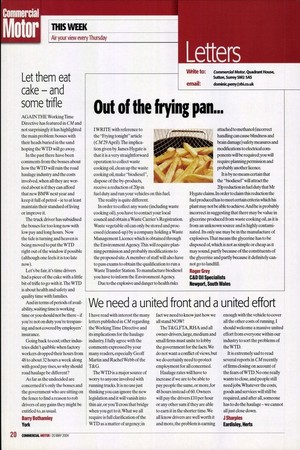Out of the frying pan...
Page 20

If you've noticed an error in this article please click here to report it so we can fix it.
I WRITE with reference to the "Frying tonight" article (CM 29 Apii1).The implication given by James Hygate is that it is a very straightforward operation to collect waste cooking oil, clean up the waste cooking oil, make "biodiesel", dispose of the by-products, receive a reduction of 20p in
fuel duty and run your vehicles on this fuel.
The reality is quite different. In order to collect any waste (including waste cooking oil), you have to contact your local council and obtain a Waste Carrier's Registration. Waste vegetable oil can only be stored and processed (cleaned-up) by a company holding a Waste Management Licence which is obtained through the Environment Agency.This will require planning permission and probably modifications to the proposed site.A member of staff will also have to pass exams to obtain the qualification to run a Waste Transfer Station.To manufacture biodiesel you have to inform the Environment Agency Due to the explosive and danger to health risks
attached to methanol (incorrect handling can cause blindness and brain damage) safety measures and modifications to electrical components will be required; you will require planning permission and probably another licence. It is by no means certain that the "biodiesel" will attract the 20p reduction in fuel duty that Mr
Hygate claimsdn order to claim this reduction the fuel produced has to meet certain criteria which his plant may not be able to achieve.And he is probably incorrect in suggesting that there may be value in glycerine produced from waste cooking oil, as it is from an unknown source and is highly contaminated. Its only use may be in the manufacture of explosives. That means the glycerine has to be disposed of, which is not as simple or cheap as it may sound, partly because of the constituents of the glycerine and partly because it definitely cannot go to landfill. Roger Grey C&D Oil Specialists Newport, South Wales




























































































































































































